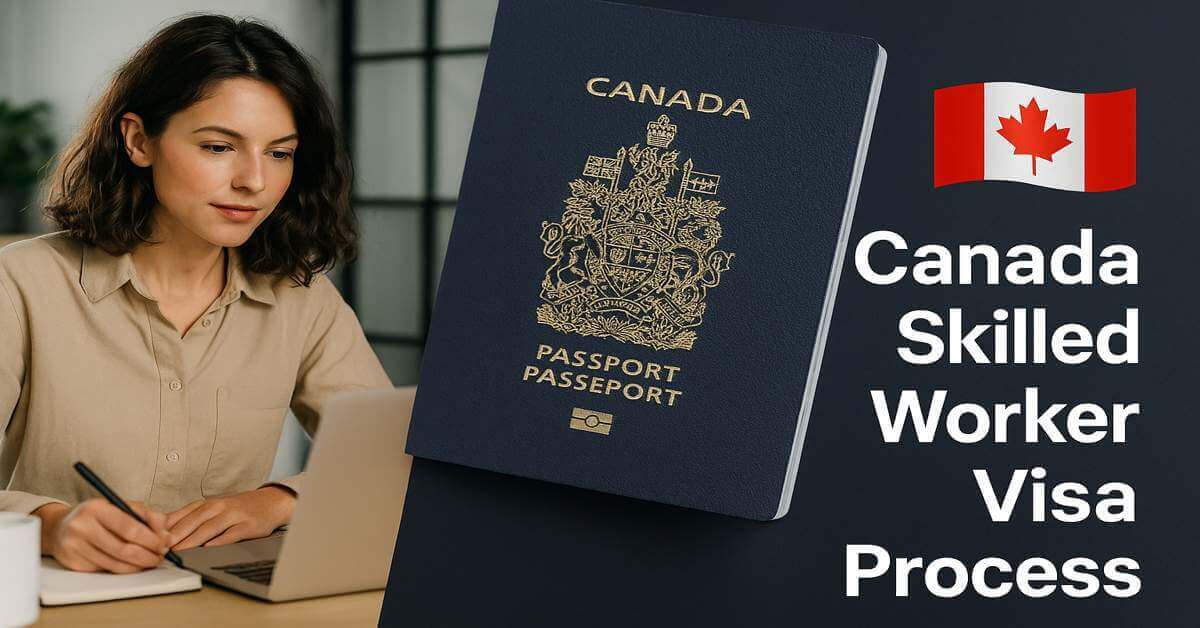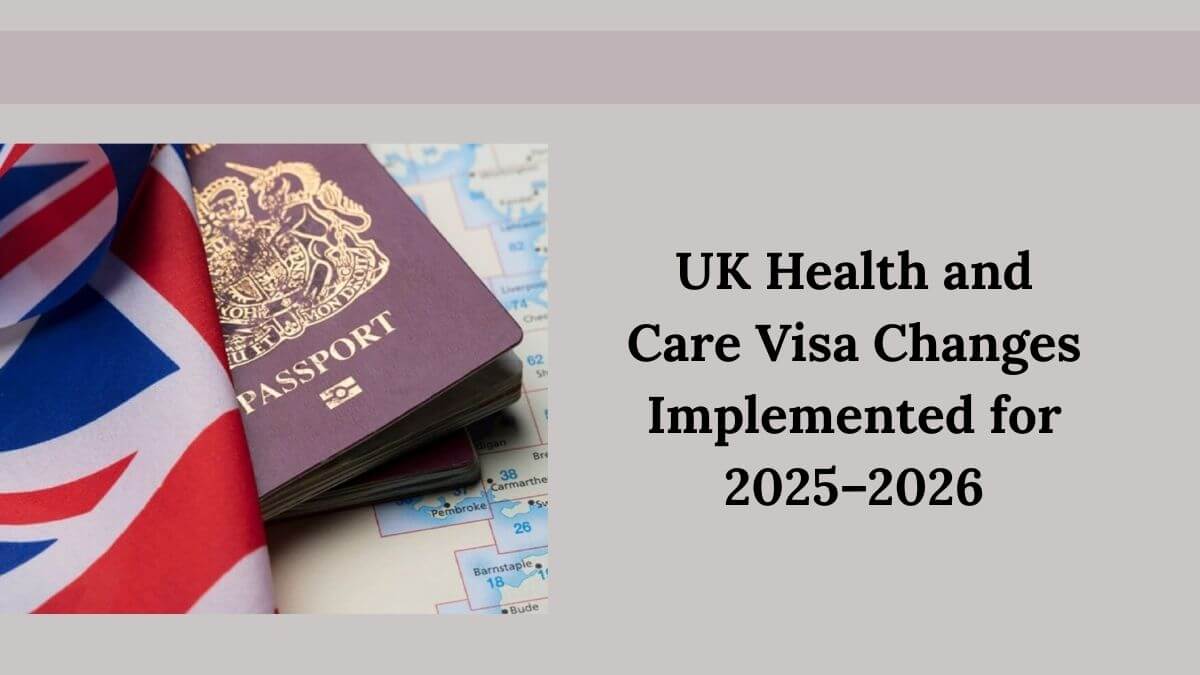Canada Skilled Worker Visa Process 2025 – Check Details

Canada is one of the top destinations for skilled professionals seeking employment abroad. With its strong economy, multicultural society, and fair immigration policies, the country offers excellent opportunities for foreign workers through both temporary work permits and permanent immigration pathways such as the Federal Skilled Worker Program (FSWP).
This guide explains how Canada’s work permit system works, outlines the types of permits available, and walks you through eligibility requirements, documents, and how to apply successfully
Check Also: Countries Offering Skill Shortage Jobs Lists With Work Visa
Canada Work Permit:
A work permit is a legal document issued by Immigration, Refugees and Citizenship Canada (IRCC) that allows a foreign national to work in Canada for a specific period. Each year, Canada issues over 500,000 temporary work permits, covering a wide range of industries such as tech, healthcare, construction, and education.
Types of Canadian Work Permits:
There are two main categories of work permits:
1. Employer-Specific (Closed) Work Permit
Allows you to work for a specific employer at a specific location. Often requires:
- A job offer
- An approved Labour Market Impact Assessment (LMIA)
2. Open Work Permit
Allows you to work for any employer (with some exceptions), without needing an LMIA. Often available to:
- International students (Post-Graduation Work Permit)
- Spouses of skilled workers or students
- Bridging Open Work Permit (BOWP) applicants
Work Permit Programs:
LMIA-Based Programs
- Temporary Foreign Worker Program (TFWP)
- High-Wage and Low-Wage streams
- Global Talent Stream
- Facilitated LMIA (for Quebec)
LMIA-Exempt Programs
- Intra-Company Transfers
- NAFTA (now CUSMA)
- CETA
- International Experience Canada (IEC)
- International Mobility Program (IMP)
Federal Skilled Worker Program (FSWP):
This is part of the Express Entry system and is a permanent residence pathway for skilled professionals.
Eligibility Criteria:
- Skilled Work Experience in a TEER 0, 1, 2, or 3 occupation (NOC)
- Language Ability: IELTS or TEF scores in all four abilities
- Education: Canadian credential or Educational Credential Assessment (ECA)
- 67 points minimum out of 100 to qualify
You will receive a Comprehensive Ranking System (CRS) score. High-scoring candidates are invited to apply for permanent residence
Required Documents:
To apply for most work permits or Express Entry:
- Valid passport
- Job offer letter (if applicable)
- LMIA (if applicable)
- Proof of work experience (letters, contracts)
- Resume/CV
- Proof of education (certificates, degrees)
- ECA (for foreign education)
- Language test results (IELTS, CELPIP, TEF)
- Medical exam (if required)
- Police clearance certificate
- Digital photo (passport-size)
- Proof of funds (for PR applicants)
How to Apply for Canada Skilled Worker Visa Process 2025?
For Work Permits:
- Get a valid job offer
- If required, employer applies for LMIA
- Submit your work permit application online
- Attend biometrics appointment and medical exam if needed
- Wait for decision from IRCC
Processing time: varies between 2–12 weeks depending on the program
For FSWP via Express Entry:
- Create your profile on IRCC Express Entry portal
- Enter the Express Entry pool
- Receive an Invitation to Apply (ITA) if your CRS score is high enough
- Submit documents for permanent residence within 60 days
- Complete medical and background checks
- Receive your Confirmation of PR (COPR)
Benefits:
Here are key advantages of getting a job in Canada:
1. Permanent Residency (PR) Pathway
Successful applicants under the Federal Skilled Worker Program (FSWP) gain permanent resident status, allowing them to live, work, or study anywhere in Canada.
2. Family Inclusion
You can include your spouse and dependent children in your application, and they will also receive PR status, giving your entire family access to Canada’s services and opportunities.
3. Work and Live Anywhere in Canada
As a PR holder, you’re not restricted to one employer or province. You can choose where to live and work, giving you flexibility and freedom across the country.
4. Access to Public Healthcare
Skilled workers and their families get access to Canada’s publicly funded healthcare system, ensuring quality medical services without high personal costs.
5. Free Education for Children
Dependent children under 18 have access to free public primary and secondary education, and post-secondary education is offered at lower tuition rates for PRs.
6. Eligibility for Social Benefits
As a permanent resident, you may qualify for social assistance programs, such as child benefits, unemployment insurance, and pension plans.
7. Job Security and Labor Protection
Canada enforces strong labor laws, ensuring workers’ rights, fair wages, occupational health, and protection against exploitation.
8. Pathway to Canadian Citizenship
After living in Canada as a PR for at least 3 out of 5 years, you may apply for Canadian citizenship, gaining full rights including the right to vote and hold a passport.
9. Global Travel Advantage
Canadian PR holders enjoy easier visa approvals or visa-free travel to several countries, boosting global mobility for both business and leisure.
10. High Standard of Living
Canada ranks high in global quality of life indexes, offering clean environments, low crime rates, strong infrastructure, and vibrant multicultural communities.
Conclusion:
Canada’s work permit programs and immigration pathways offer a range of options for skilled and semi-skilled workers. By understanding the system, gathering the right documents, and submitting a strong application, you can increase your chances of success in relocating and working in Canada
Frequently Asked Questions:
Can I bring my family with me?
Yes. You can include your spouse and dependent children in your permanent residence application. Spouses may also be eligible for an open work permit.
What is the Canada Skilled Worker Visa?
The Canada Skilled Worker Visa refers to the Federal Skilled Worker Program (FSWP), which is managed through Express Entry. It allows skilled foreign professionals to apply for permanent residence based on work experience, education, language skills, and adaptability.
Can I apply for a work permit without a job offer?
Yes, if you qualify for an open work permit, such as through Post-Graduate Work Permit or spousal sponsorship.



